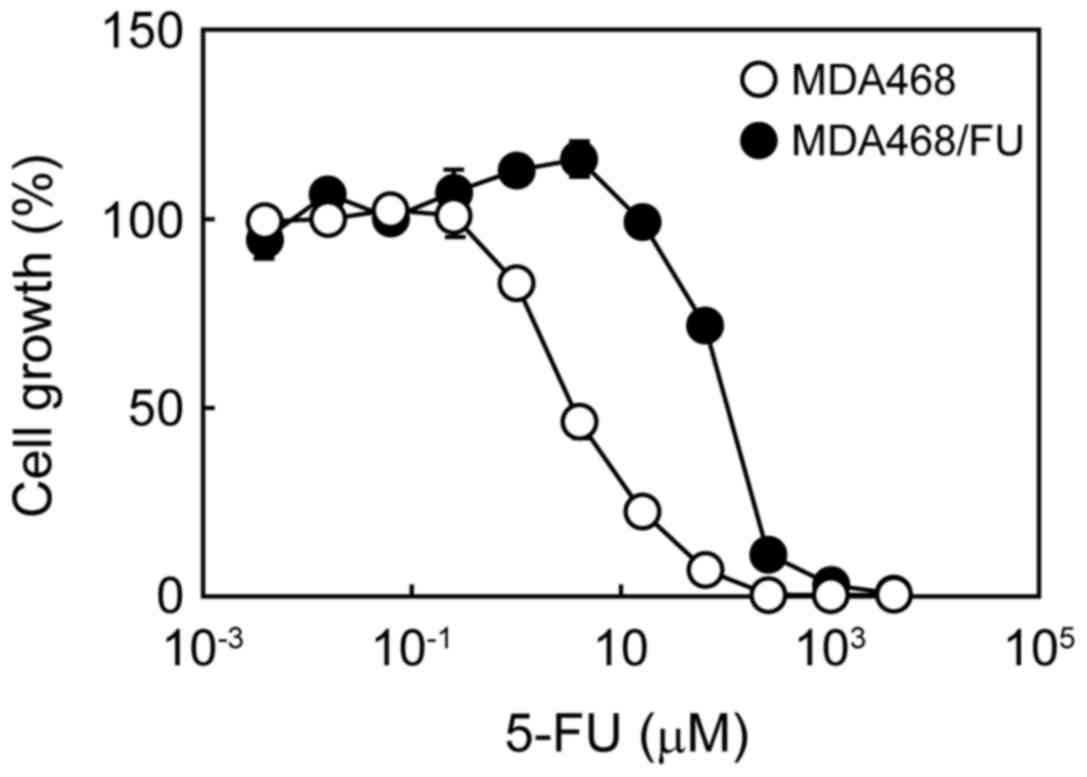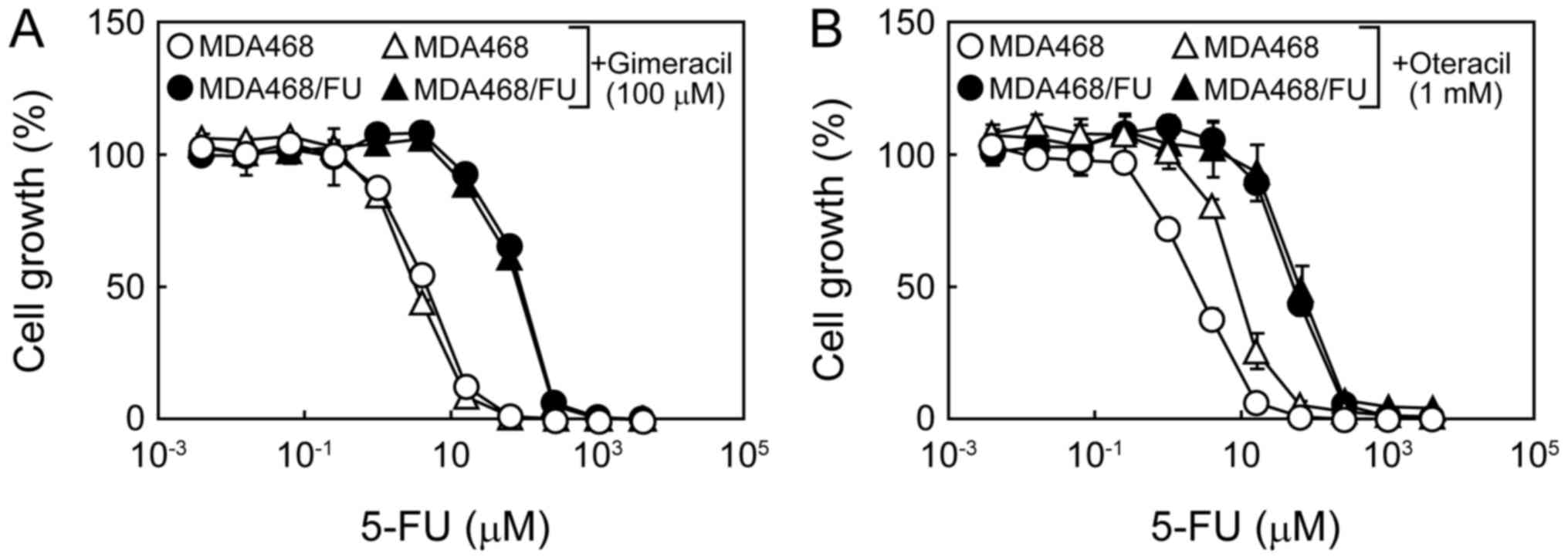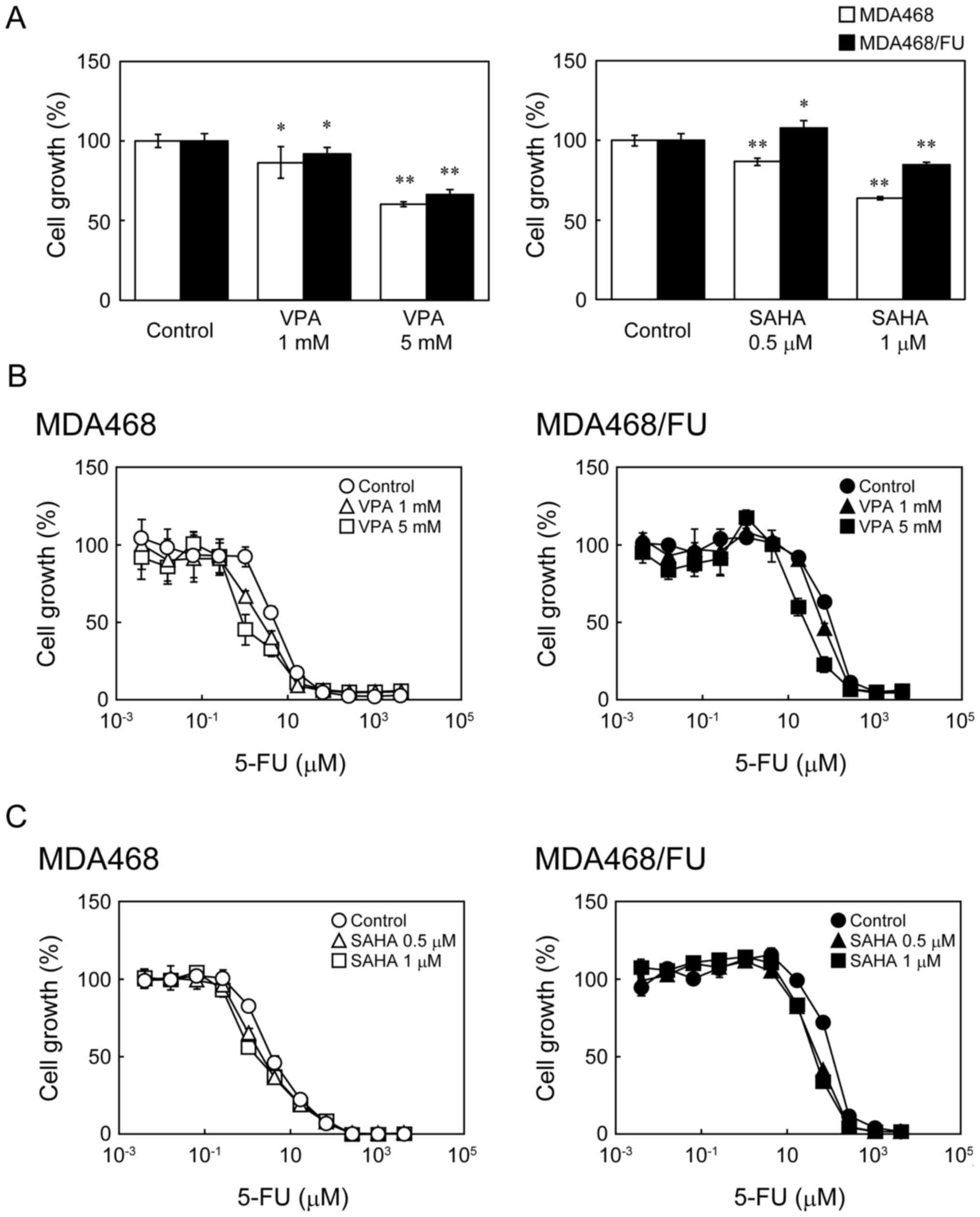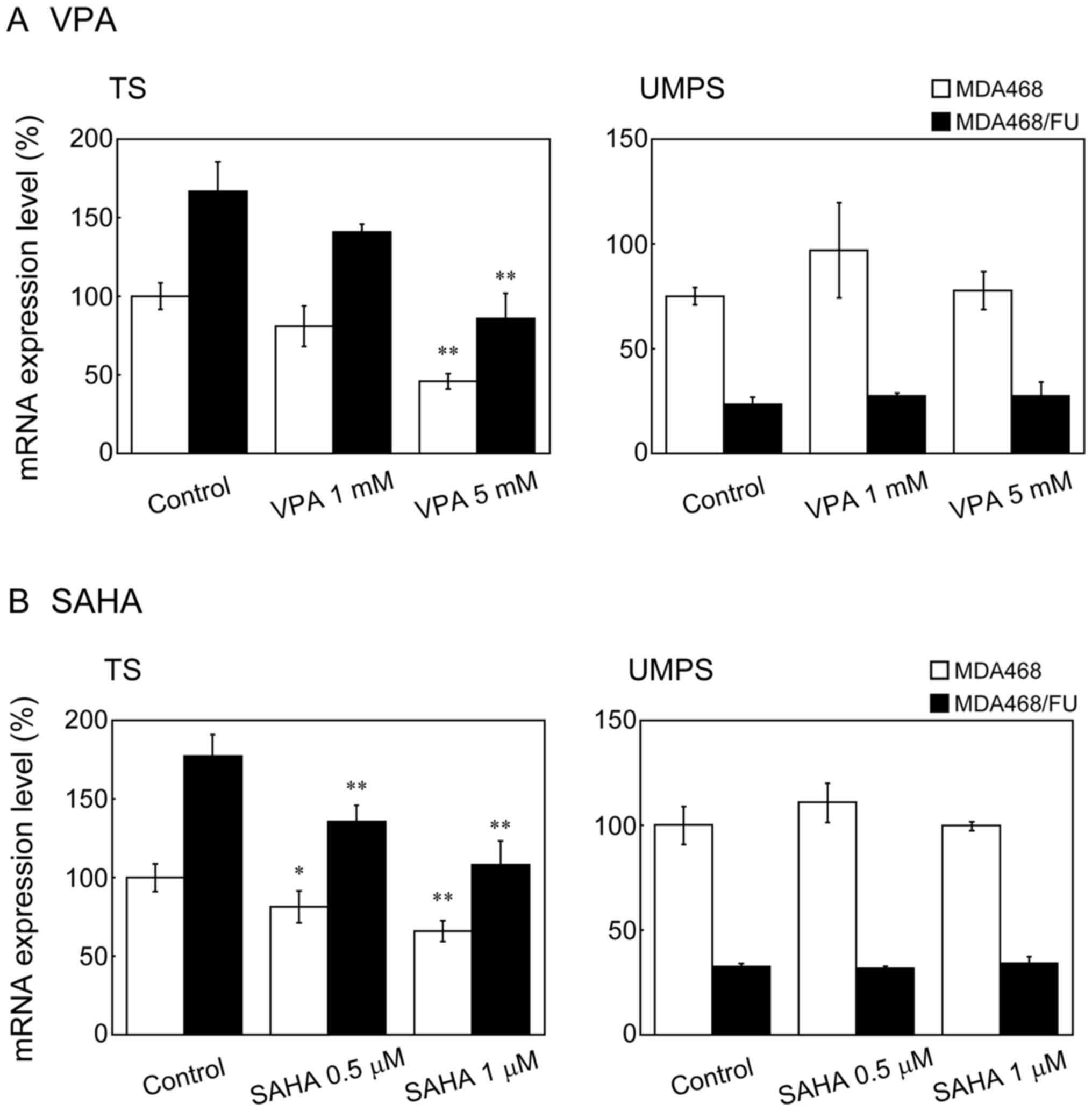|
1
|
Habara K, Ajiki T, Kamigaki T, Nakamura T
and Kuroda Y: High expression of thymidylate synthase leads to
resistance to 5-fluorouracil in biliary tract carcinoma in vitro.
Jpn J Cancer Res. 92:1127–1132. 2001. View Article : Google Scholar : PubMed/NCBI
|
|
2
|
Yasumatsu R, Nakashima T, Uryu H, Masuda
M, Hirakawa N, Shiratsuchi H, Tomita K, Fukushima M and Komune S:
The role of dihydropyrimidine dehydrogenase expression in
resistance to 5-fluorouracil in head and neck squamous cell
carcinoma cells. Oral Oncol. 45:141–147. 2009. View Article : Google Scholar : PubMed/NCBI
|
|
3
|
Pratt S, Shepard RL, Kandasamy RA,
Johnston PA, Perry W III and Dantzig AH: The multidrug resistance
protein 5 (ABCC5) confers resistance to 5-fluorouracil and
transports its monophosphorylated metabolites. Mol Cancer Ther.
4:855–863. 2005. View Article : Google Scholar : PubMed/NCBI
|
|
4
|
Eckschlager T, Plch J, Stiborova M and
Hrabeta J: Histone deacetylase inhibitors as anticancer drugs. Int
J Mol Sci. 18:pii: E1414. 2017. View Article : Google Scholar
|
|
5
|
Khangura RK, Bali A, Jaggi AS and Singh N:
Histone acetylation and histone deacetylation in neuropathic pain:
An unresolved puzzle? Eur J Pharmacol. 795:36–42. 2017. View Article : Google Scholar : PubMed/NCBI
|
|
6
|
Rauzan M, Chuah CT, Ko TK and Ong ST: The
HDAC inhibitor SB939 overcomes resistance to BCR-ABL kinase
inhibitors conferred by the BIM deletion polymorphism in chronic
myeloid leukemia. PLoS One. 12:e01741072017. View Article : Google Scholar : PubMed/NCBI
|
|
7
|
To KK, Tong WS and Fu LW: Reversal of
platinum drug resistance by the histone deacetylase inhibitor
belinostat. Lung Cancer. 103:58–65. 2017. View Article : Google Scholar : PubMed/NCBI
|
|
8
|
Fazzone W, Wilson PM, Labonte MJ, Lenz HJ
and Ladner RD: Histone deacetylase inhibitors suppress thymidylate
synthase gene expression and synergize with the fluoropyrimidines
in colon cancer cells. Int J Cancer. 125:463–473. 2009. View Article : Google Scholar : PubMed/NCBI
|
|
9
|
Zhang X, Yashiro M, Ren J and Hirakawa K:
Histone deacetylase inhibitor, trichostatin A, increases the
chemosensitivity of anticancer drugs in gastric cancer cell lines.
Oncol Rep. 16:563–568. 2006.PubMed/NCBI
|
|
10
|
Ocker M, Alajati A, Ganslmayer M, Zopf S,
Lüders M, Neureiter D, Hahn EG, Schuppan D and Herold C: The
histone-deacetylase inhibitor SAHA potentiates proapoptotic effects
of 5-fluorouracil and irinotecan in hepatoma cells. J Cancer Res
Clin Oncol. 131:385–394. 2005. View Article : Google Scholar : PubMed/NCBI
|
|
11
|
Minegaki T, Fukushima S, Morioka C,
Takanashi H, Uno J, Tsuji S, Yamamoto S, Watanabe A, Tsujimoto M
and Nishiguchi K: Effects of bisphosphonates on human esophageal
squamous cell carcinoma cell survival. Dis Esophagus. 29:656–662.
2016. View Article : Google Scholar : PubMed/NCBI
|
|
12
|
Takara K, Sakaeda T, Yagami T, Kobayashi
H, Ohmoto N, Horinouchi M, Nishiguchi K and Okumura K: Cytotoxic
effects of 27 anticancer drugs in HeLa and MDR1-overexpressing
derivative cell lines. Biol Pharm Bull. 25:771–778. 2002.
View Article : Google Scholar : PubMed/NCBI
|
|
13
|
Catalano S, Giordano C, Panza S, Chemi F,
Bonofiglio D, Lanzino M, Rizza P, Romeo F, Fuqua SA, Maggiolini M,
et al: Tamoxifen through GPER upregulates aromatase expression: A
novel mechanism sustaining tamoxifen-resistant breast cancer cell
growth. Breast Cancer Res Treat. 146:273–285. 2014. View Article : Google Scholar : PubMed/NCBI
|
|
14
|
Yoshinare K, Kubota T, Watanabe M, Wada N,
Nishibori H, Hasegawa H, Kitajima M, Takechi T and Fukushima M:
Gene expression in colorectal cancer and in vitro chemosensitivity
to 5-fluorouracil: A study of 88 surgical specimens. Cancer Sci.
94:633–638. 2003. View Article : Google Scholar : PubMed/NCBI
|
|
15
|
Matsubara J, Nishina T, Yamada Y, Moriwaki
T, Shimoda T, Kajiwara T, Nakajima TE, Kato K, Hamaguchi T, Shimada
Y, et al: Impacts of excision repair cross-complementing gene 1
(ERCC1), dihydropyrimidine dehydrogenase, and epidermal growth
factor receptor on the outcomes of patients with advanced gastric
cancer. Br J Cancer. 98:832–839. 2008. View Article : Google Scholar : PubMed/NCBI
|
|
16
|
Gustavsson B, Kaiser C, Carlsson G,
Wettergren Y, Odin E, Lindskog EB, Niyikiza C and Ma D: Molecular
determinants of efficacy for 5-FU-based treatments in advanced
colorectal cancer: mRNA expression for 18 chemotherapy-related
genes. Int J Cancer. 124:1220–1226. 2009. View Article : Google Scholar : PubMed/NCBI
|
|
17
|
Livak KJ and Schmittgen TD: Analysis of
relative gene expression data using real-time quantitative PCR and
the 2(-Delta Delta C(T)) method. Methods. 25:402–408. 2001.
View Article : Google Scholar : PubMed/NCBI
|
|
18
|
Minegaki T, Takara K, Hamaguchi R,
Tsujimoto M and Nishiguchi K: Factors affecting the sensitivity of
human-derived esophageal carcinoma cell lines to 5-fluorouracil and
cisplatin. Oncol Lett. 5:427–434. 2013. View Article : Google Scholar : PubMed/NCBI
|
|
19
|
Ciaparrone M, Quirino M, Schinzari G,
Zannoni G, Corsi DC, Vecchio FM, Cassano A, La Torre G and Barone
C: Predictive role of thymidylate synthase, dihydropyrimidine
dehydrogenase and thymidine phosphorylase expression in colorectal
cancer patients receiving adjuvant 5-fluorouracil. Oncology.
70:366–377. 2006. View Article : Google Scholar : PubMed/NCBI
|
|
20
|
Miura K, Kinouchi M, Ishida K, Fujibuchi
W, Naitoh T, Ogawa H, Ando T, Yazaki N, Watanabe K, Haneda S, et
al: 5-fu metabolism in cancer and orally-administrable 5-fu drugs.
Cancers (Basel). 2:1717–1730. 2010. View Article : Google Scholar : PubMed/NCBI
|
|
21
|
Tsutani Y, Yoshida K, Sanada Y, Wada Y,
Konishi K, Fukushima M and Okada M: Decreased orotate
phosphoribosyltransferase activity produces 5-fluorouracil
resistance in a human gastric cancer cell line. Oncol Rep.
20:1545–1551. 2008.PubMed/NCBI
|
|
22
|
Oguri T, Achiwa H, Bessho Y, Muramatsu H,
Maeda H, Niimi T, Sato S and Ueda R: The role of thymidylate
synthase and dihydropyrimidine dehydrogenase in resistance to
5-fluorouracil in human lung cancer cells. Lung Cancer. 49:345–351.
2005. View Article : Google Scholar : PubMed/NCBI
|
|
23
|
Saga Y, Suzuki M, Mizukami H, Kohno T,
Takei Y, Fukushima M and Ozawa K: Overexpression of thymidylate
synthase mediates desensitization for 5-fluorouracil of tumor
cells. Int J Cancer. 106:324–326. 2003. View Article : Google Scholar : PubMed/NCBI
|
|
24
|
Wang W, McLeod HL, Cassidy J and
Collie-Duguid ES: Mechanisms of acquired chemoresistance to
5-fluorouracil and tomudex: Thymidylate synthase dependent and
independent networks. Cancer Chemother Pharmacol. 59:839–845. 2007.
View Article : Google Scholar : PubMed/NCBI
|
|
25
|
Takara K, Kitada N, Yoshikawa E, Yamamoto
K, Horibe S, Sakaeda T, Nishiguchi K, Ohnishi N and Yokoyama T:
Molecular changes to HeLa cells on continuous exposure to SN-38, an
active metabolite of irinotecan hydrochloride. Cancer Lett.
278:88–96. 2009. View Article : Google Scholar : PubMed/NCBI
|



















